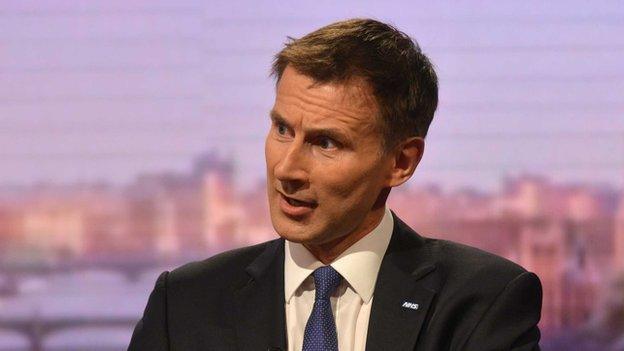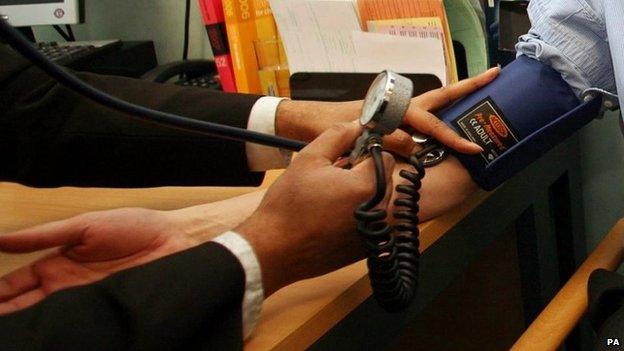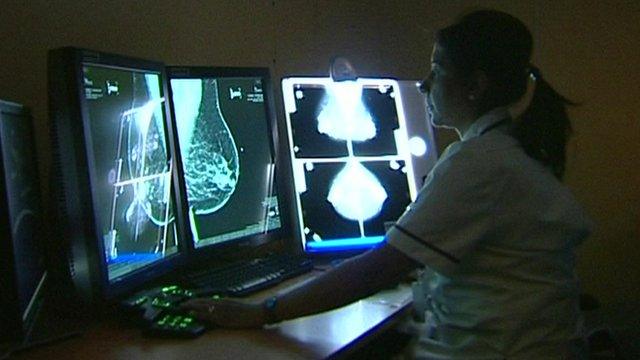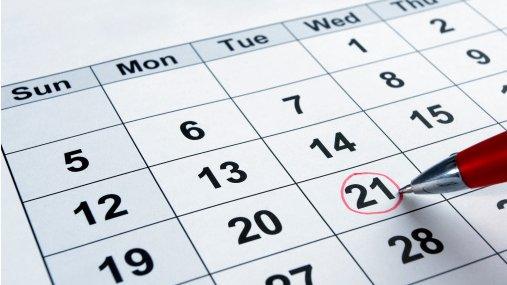GPs who fail to spot cancer could be named
- Published
Dr Chaand Nagpaul, from the BMA's GP committee, says naming and shaming is not the answer
GPs with a poor record in spotting signs of cancer could be publicly named under new government plans.
Health Secretary Jeremy Hunt wants to expose doctors whose failure to spot cancer may delay sending patients for potentially life-saving scans.
Labour called the idea "desperate" and accused Mr Hunt of attacking doctors.
The Royal College of GPs said it would be a "crude" system and one that could lead to GPs sending people to specialists indiscriminately.
It warned this could result in flooding hospitals with healthy people.
The move is part of the health secretary's plans to make the NHS more transparent.
Ranking GP surgeries on how quickly they spot cases of cancer and refer patients for treatment is among proposals being considered.

Jeremy Hunt says more needs to be done to improve cancer detection
The information could eventually be published on the NHS website.
This follows a survey for the NHS last year, which suggested that more than a quarter of people eventually diagnosed with cancer had seen their GP at least three times before being sent to a specialist.
"We need to do much better," the health secretary told the Mail on Sunday, external.
"Cancer diagnosis levels around the country vary significantly and we must do much more to improve both the level of diagnosis and to bring those GP practices with poor referral rates up to the standards of the best."
Doctors found to be missing too many cases of cancer or with patients who are forced to make repeated visits before being referred for tests would be marked with a red flag.

A patient's story
Susan has a sister with terminal cancer.
She told the BBC: "My sister was first told she had a prolapsed womb, then piles.
"By the time she was seen by an oncologist, eight months had elapsed.
"She has terminal squamous cell anal cancer - completely curable if caught early enough.
"She is 62, and now has a few months to live.
"One of the classic mistakes the GP made was to diagnose anal bleeding as piles. It wasn't - it was the tumour.
"This doctor has condemned my sister to a year, so far, of terrible suffering and a death which is too dreadful to contemplate, when she could have been completely cured.
"Prognosis is something like 96% complete cure if treated early."
Susan believes her sister's GP should be "named and shamed" but thinks each case should be considered on an individual basis.
"As a retired teacher, I know what being continually maligned, judged, overlooked and overloaded can do to morale and performance," she added.

Those found with quick referral times for patients would be given a green rating.
Shadow health minister Jamie Reed said the government would not take responsibility for problems it had created in the NHS.
"David Cameron wasted billions on a re-organisation nobody wanted and left cancer patients waiting longer for tests and treatment. He should be ashamed of his own record - not attacking doctors," he said.
"This government has thrown away progress made on cancer care. It is proof of why the Tories can't be trusted with the NHS."
'Clog up clinics'
Dr Chaand Nagpaul, chair of the British Medical Association general practitioners committee, said to name and shame doctors would not help patients.
He said it was important to understand why there were delays in making referrals and to raise public awareness about the signs and symptoms of cancer.
"We need to look at the whole system and if you simply name and shame GPs, the tendency would be for us to refer everyone," he told the BBC.
"And that can be a disadvantage because if we clog up hospital outpatient clinics, we'll get patients who need to see their specialist actually having to wait longer."

Conservative MP Sarah Wollaston called for increased spending on the NHS
Conservative MP Sarah Wollaston, a former GP who chairs the Commons health select committee, said the government needed to be careful not to wrongly label people as "poor doctors".
She too warned there was a danger of automatically referring everyone to a specialist and creating "impossibly long waiting lists", which could harm those needing to be seen urgently.
Rising demand
Dr Wollaston added that she could not see how GPs could maintain current levels of service amid rising demand without a funding injection.
"The NHS budget has been protected in line with background inflation but that does not keep pace with inflation in health costs from rising demand and demographic changes," she said.
"I don't want to see any reduction in services. I would like to see further improvements and that will require an increase in funding."
Dr Wollaston joined Conservative former health secretary Stephen Dorrell and Lib Dem former health minister Paul Burstow in calling for increased funding for the NHS.
Mr Burstow warned that the NHS was in danger of collapse within five years without extra spending. He said the health service needed an extra £15bn over that period in order to function properly.
Mr Dorrell said he would be ashamed if the government failed to increase NHS funding at a time when the economy was growing.
"I am in favour of the government not denying what 5,000 years of history tells us is true, which is that every time a society gets richer it spends a rising share of its income on looking after the sick and the vulnerable," he told The Observer., external
- Published29 June 2014

- Published29 April 2014
- Published30 May 2014
